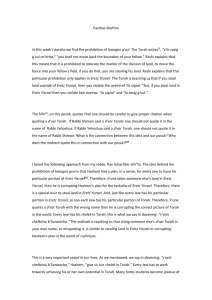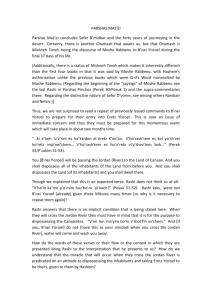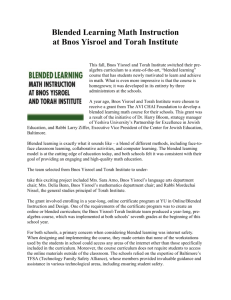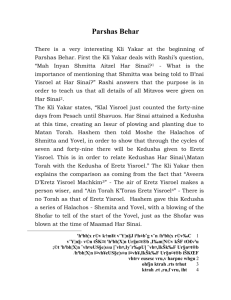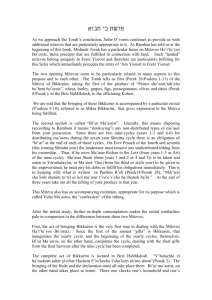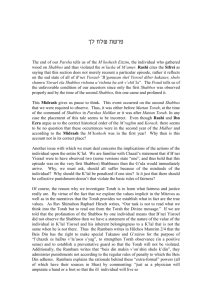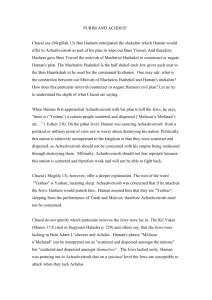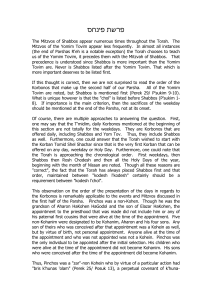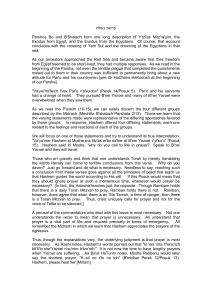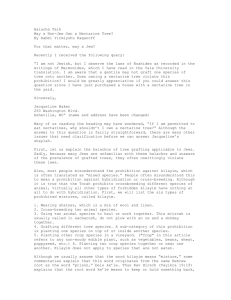פרשות נצבים/וילך
advertisement
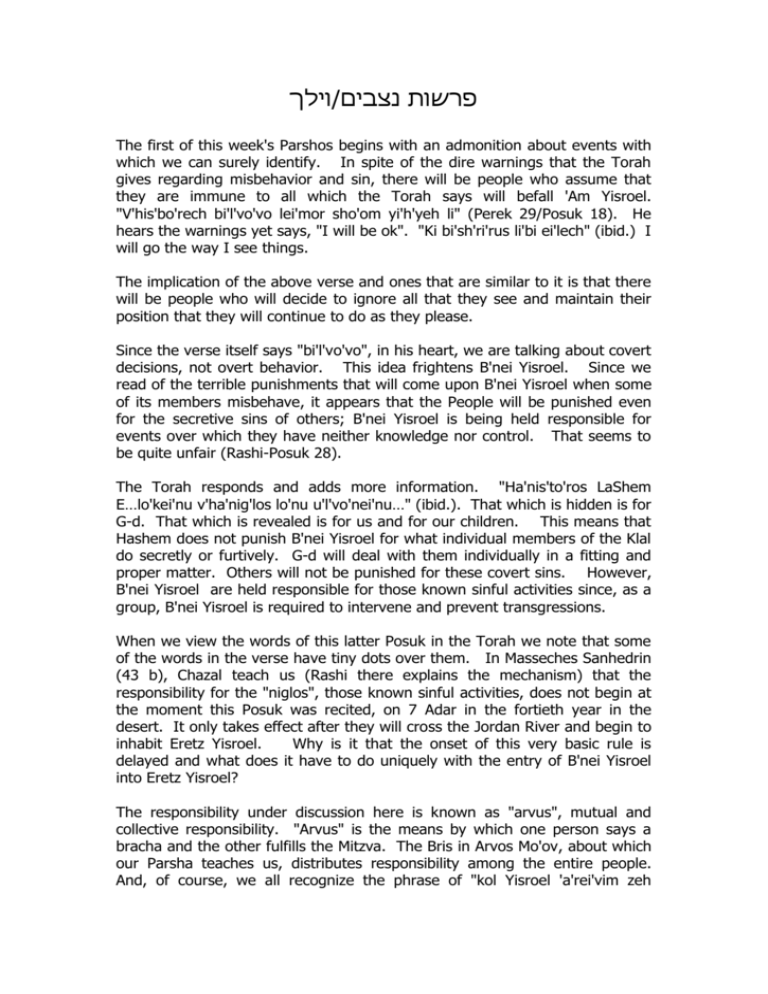
וילך/פרשות נצבים The first of this week's Parshos begins with an admonition about events with which we can surely identify. In spite of the dire warnings that the Torah gives regarding misbehavior and sin, there will be people who assume that they are immune to all which the Torah says will befall 'Am Yisroel. "V'his'bo'rech bi'l'vo'vo lei'mor sho'om yi'h'yeh li" (Perek 29/Posuk 18). He hears the warnings yet says, "I will be ok". "Ki bi'sh'ri'rus li'bi ei'lech" (ibid.) I will go the way I see things. The implication of the above verse and ones that are similar to it is that there will be people who will decide to ignore all that they see and maintain their position that they will continue to do as they please. Since the verse itself says "bi'l'vo'vo", in his heart, we are talking about covert decisions, not overt behavior. This idea frightens B'nei Yisroel. Since we read of the terrible punishments that will come upon B'nei Yisroel when some of its members misbehave, it appears that the People will be punished even for the secretive sins of others; B'nei Yisroel is being held responsible for events over which they have neither knowledge nor control. That seems to be quite unfair (Rashi-Posuk 28). The Torah responds and adds more information. "Ha'nis'to'ros LaShem E…lo'kei'nu v'ha'nig'los lo'nu u'l'vo'nei'nu…" (ibid.). That which is hidden is for G-d. That which is revealed is for us and for our children. This means that Hashem does not punish B'nei Yisroel for what individual members of the Klal do secretly or furtively. G-d will deal with them individually in a fitting and proper matter. Others will not be punished for these covert sins. However, B'nei Yisroel are held responsible for those known sinful activities since, as a group, B'nei Yisroel is required to intervene and prevent transgressions. When we view the words of this latter Posuk in the Torah we note that some of the words in the verse have tiny dots over them. In Masseches Sanhedrin (43 b), Chazal teach us (Rashi there explains the mechanism) that the responsibility for the "niglos", those known sinful activities, does not begin at the moment this Posuk was recited, on 7 Adar in the fortieth year in the desert. It only takes effect after they will cross the Jordan River and begin to inhabit Eretz Yisroel. Why is it that the onset of this very basic rule is delayed and what does it have to do uniquely with the entry of B'nei Yisroel into Eretz Yisroel? The responsibility under discussion here is known as "arvus", mutual and collective responsibility. "Arvus" is the means by which one person says a bracha and the other fulfills the Mitzva. The Bris in Arvos Mo'ov, about which our Parsha teaches us, distributes responsibility among the entire people. And, of course, we all recognize the phrase of "kol Yisroel 'a'rei'vim zeh bo'zeh". Mutual responsibility is an inherent and intrinsic part of our Peoplehood. The idea that "kol Yisroel 'a'rei'vim zeh bo'zeh", though, does not have its source in our Parsha. Chazal understood the verse, "v'cho'sh'lu ish b'ochiv" (Vayikra Perek 26/Posuk 27). As they are fleeing from their enemies, B'nei Yisroel will fall and trip over each other. Just like in physical terms, one can be "tripped up", spiritually that is no less true. That is, there is "arvus", mutual responsibility. This is explained by Chazal in Masseches Shvu'os (39 a). Since that concept has already been established, why is repeated in our Parsha? It would seem that the Bris that is undertaken in our Parsha, at the very end of the sojourn in the Midbar, is most different from that which was undertaken at Sinai some 40 years earlier. The nature of Mattan Torah, as we learn in Masseches Shabbos (88 a), was "ko'foh 'a'lei'hem har k'gi'gis". HaKodosh Boruch held Har Sinai over their heads, as if it was a huge barrel, and coerced them into receiving the Torah. The precise nature of that coercion is a matter of great discussion. Nonetheless, it did take place. The nature of the covenant in our discussion was not done under that same threat of immediate death. They were urged, cajoled and threatened. Yet, they were not physically threatened. At Har Sinai they required the overpowering act of the mountain being raised dangerously in order to enable them to accept the Torah. What would replace imminent danger as a means of furthering the strengthening of their commitment to the acceptance and fulfillment of the covenant? It seems that the strong and unique bonds of 'Am Yisroel was chosen for that mechanism of strengthening their commitment. When we learn of "kol Yisroel 'a'rei'vim zeh bo'zeh" in the Tochecha in Parshas B'chukosai, above, we are told of the relevance of this principle in the future. It relates to hundreds of years hence when there will be the destruction as foretold in the Tochecha. Then you will know that "kol Yisroel 'a'rei'vim zeh bo'zeh". It is not being used a principle relevant at that moment, at Sinai. The principle is becoming relevant at this moment, when the era of the Midbar is coming to its close and the new era of taking up residence in Eretz Yisroel is literally in the next days. The Netziv, in his introduction to Sefer B'midbar, expresses the distinction between life in the desert and the expected life in Eretz Yisroel most succinctly. With even greater brevity, the distinction between the life in the desert and that which would be in Eretz Yisroel is that life in the desert was marked by the supernatural. The everyday life in the desert of B'nei Yisroel was marked by the miraculous. Their bread and water and meat all came by means that were far removed from "natural" life. Nes-miracle was the rule, not the exception. In Eretz Yisroel they would begin a life that would be "b'derech ha'teva' b'sis'rei hash'go'chas mal'chus sho'ma'yim Yisborach." They would live a "natural life" according to the concealed providence of Hashem's rule. Living a life in which the supernatural prevailed was tantamount to "har k'gi'gis" on a daily basis. The same apparent Yad Hashem that brought bounty and generosity could bring punishment and death with the same ease. That presence of Hashem that was so obvious served as a constant inhibitor of sin and a promoter of allegiance to G-d's rule. In Eretz Yisroel, and in our Parsha, our ancestors were standing on the threshold of entry into Eretz Yisroel and life would soon be radically different. They would no longer naturally sense the Sh'china. They would no longer naturally sense the gracious Yad Hashem which could be destructive. That which prompted them in the desert would no longer be with them. It is for that reason that "kol Yisroel 'a'rei'vim zeh bozeh" becomes relevant now. It is also for that reason that the "now" of its relevance isn't exactly "now". It will only be a little later on, after they enter Eretz Yisroel and will again affirm the covenant near Sh'chem. Thus, when Chazal teach that the dots hint at the postpone of the actualization of this principle, we can now begin to understand why it was so. With this base of knowledge we can view the explanation offered by Chasam Sofer in a new light. In commenting on the verse, "Ha'nis'to'ros LaShem E…lo'kei'nu v'ha'nig'los lo'nu u'l'vo'nei'nu…", he cites the Chovos Ha'l'vo'vos in Sha'ar Ha'pri'shus in which asceticism is the subject. There, in the third perek, Chovos Ha'l'vo'vos tells us of the superior way to demonstrate asceticism. It is not by imposing exile on oneself. It is not by constantly fasting and having self-inflicted punishment. True "prishus" is marked by people "she'por'shu min ho'o'lom b'li'bo'som u'v'matz'pu'nom v'hish'tat'fu'im an'shei ho'o'lom b'nir'eh mi'gu'fei'hem b'yi'shuv ho'o'lom." They have separated themselves from the [material] world in their hearts and in their conscience. And they are partners in their efforts (lit. bodies) with humanity, as it appears, in meeting the needs of the world. Prishus, says Chovos Ha'l'vo'vos is also tznius and modesty. The austerity is personal and internal. It is done in a way not to make waves. It shows a true dedication to Hashem while it does not at all make the person different or separate from the rest of humanity. This remarkable idea is seen by Chasam Sofer as reflected in the verse "Ha'nis'to'ros LaShem E…lo'kei'nu v'ha'nig'los lo'nu u'l'vo'nei'nu…". Hanistoros, the hidden part of people, their hearts and conscience, are LaShem E…lo'kei'nu, to be directed towards Him Yisborach. Vhaniglos, that which is visible and apparent, "lonu ulvoneinu", is for us and our children, i.e. for the benefit of humanity. What appears on the surface to be a "charming" explanation, far removed from the actual intent of the verse, can now be seen as a reasonable alternative to the simple translation. That is because this interpretation reflects the epitome of personal accomplishment of prishus in Eretz Yisroel, the actualization of the application of "kol Yisroel 'a'rei'vim zeh bo'zeh". In Eretz Yisroel life would not be marked by the supernatural. Sustenance would not come through apparent miracles, but through that hidden Divine Providence. The test of 'Am Yisroel in Eretz Yisroel would be to not lose its internal true dedication to the spiritual values of Torah while continuing to be an active partner in the building of a material world. The one who would not find a contradiction in such flexible behavior exemplifies the "porush". It is apparent that such greatness of spirit cannot exist in a vacuum if it is apply to more than to one person out of a hundred thousand. To make such behavior a goal for the Klal there must be a mechanism to bring such exalted behavior within the reach of Everyman. Rather than being a divergence from the thrust of the Posuk, Chasam Sofer offers a view that is only the other side of the same coin. There are those who wish to place all their interest in the "nistoros", that which is hidden, at the expense of the "niglos", those obligations which are known to them and that should be at the forefront of their activities. They wish to exchange that which should be their personal and private sincere dedication to Torah values for an outward display that is not in consonance with the outward behavior the Torah demands from us: fulfilling His mitzvos and making our contribution to "yishuvo shel 'olom" with modesty and humility. With such an attitude, the niglos, used in the benefit of humanity, become directed towards G-d and bring His rule and majesty to the world. Shabbat Shalom Ksiva Vachasima Tova Rabbi Pollock
